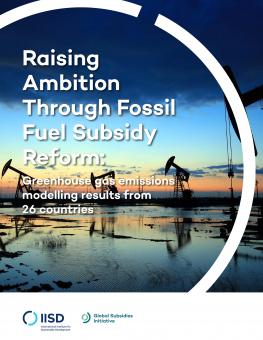
Raising Ambition Through Fossil Fuel Subsidy Reform: Greenhouse gas emissions results modelling from 26 countries
This working paper models 26 countries and finds national average emission reductions of 6 per cent from the removal of fossil fuel subsidies. For every tonne of CO2e removed through FFSR, governments save an average of USD 93. Global emission reductions from reforms are between 6.4 and 8.2 per cent by 2050. Countries can consider the carbon reduction co-benefits from FFSR and taxation within second-generation Nationally Determined Contributions.
-
Modelling across 26 countries finds a simple national average of 6% #GHG emission reductions when subsidies to fossil fuels are removed.
-
Global #GHG emission reductions from fossil fuel subsidy reform range between 6.4% and 8.2% by 2050 according to a review of 60 papers.
-
For every tonne of CO2e removed through fossil fuel subsidy reform, governments save an average of USD 93.
Key Messages
- Modelling across 26 countries finds a simple national average of 6 per cent greenhouse gas (GHG) emission reductions when subsidies to fossil fuels are removed. This average reduction improves to 13.2 per cent with a modest fossil fuel tax and a switch from savings and revenues into renewables and energy efficiency.
- Global GHG emission reductions from fossil fuel subsidy reform (FFSR) range between 6.4 and 8.2 per cent by 2050 according to a review of 60 papers concerned with FFSR and fossil fuel and carbon taxation.
- Countries can consider FFSR or fossil fuel taxation, with swaps toward sustainable energy within second-generation Nationally Determined Contributions.
This working paper models the impact of the removal of fossil fuel subsidies on greenhouse gas (GHG) emission reductions for the following countries: Algeria, Bangladesh, Brazil, China, Egypt, Germany, Ghana, India, Indonesia, Iran, Iraq, Mexico, Morocco, Myanmar, Nigeria, Pakistan, Russia, Saudi Arabia, South Africa, Sri Lanka, Tunisia, United Arab Emirates, the United States, Venezuela, Vietnam and Zambia. The research found simple country average GHG emission reductions of 6 per cent from 2018 until 2025, compared to business as usual. With an additional 10 per cent energy tax from 2025 until 2030 and a shift of 30 per cent of the savings from reforms and of revenues from taxation into investments in renewable energy and energy efficiency (i.e., a swap), GHG emission reductions improve to an average of 13.2 per cent by 2030. Cumulative fiscal savings from fossil fuel subsidy reform (FFSR) alone by 2030 total USD 2.56 trillion across the countries analyzed, with total cumulative GHG emissions abated from FFSR of 4.8 GtCO2e by 2030. For every tonne of CO2e removed through FFSR, governments save an average of USD 93.
This study also includes a literature review of 60 pieces of research on global GHG emission reductions stemming from negative and positive carbon pricing. We reviewed 40 papers concerned with FFSR and 20 papers focused on fossil fuel energy or carbon taxation. Our review found that global studies of fossil fuel subsidy removal result in emission reductions of between 1 and 10 per cent by 2030 and between 6.4 and 8.2 per cent by 2050. Removing fossil fuel subsidies and applying appropriate taxation could reduce emissions by a much larger 28 per cent globally. Fossil fuel subsidies act as a negative carbon price and could also be considered along with carbon pricing discussions. Furthermore, governments could consider the co-benefits of GHG emission reductions from FFSR and taxation, and include these policies within second-generation Nationally Determined Contributions.
You might also be interested in
COP27 diary (November 16): '$100 billion in climate finance more of gesture from rich countries'
The 27th Conference of Parties (COP27) to the United Nations Framework Convention on Climate Change in Sharm El-Sheikh, Egypt, began November 7, 2022. Here’s a look at what happened on day 10 of COP27 climate talks. The draft text for a cover decision is yet to be produced by the COP27 Presidency as of 7.30 am November 17, leading many to wonder how long discussions will continue to arrive at a consensus on the document once released. Just two days of the summit remain.
Governments are subsidizing the destruction of nature even as they promise to protect it
When dignitaries from 196 countries converge in Montreal next week to rub shoulders and hash out a new global agreement to save nature, money will be on the agenda.
The Cost of Fossil Fuel Reliance
Government support for fossil fuels reached at least USD 1.5 trillion in 2023, new data shows.
Increased Support Needed to Achieve India's Clean Energy Goals
India is on track to achieve many of its 2030 clean energy goals but needs to step up government support measures to accelerate the deployment of offshore wind, electric vehicles, and green hydrogen, according to a new report.